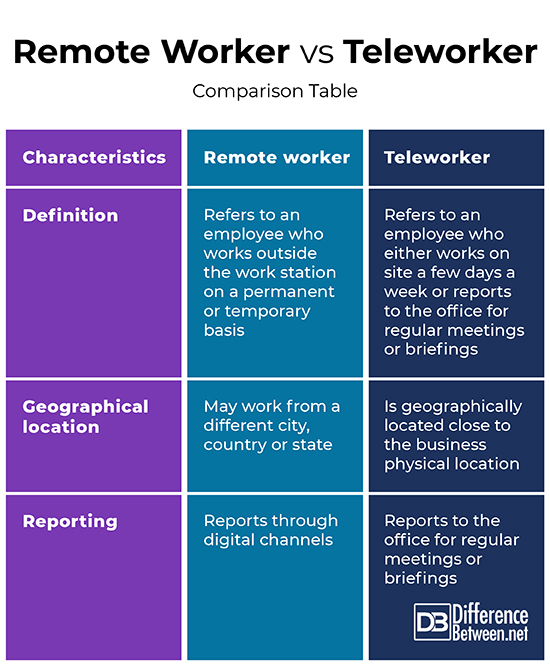Difference Between Remote Worker and Teleworker
The digital industry has revolutionized working spaces all over the world. It’s no surprise of the new digital era of remote workers, freelancers, contractors, and teleworkers. While it was the norm for a person to have a fulltime job and work from the office, people can nowadays work remotely. In these scenarios, companies make work arrangements based on the nature of jobs, to the benefit of both employers and employees. While these two terms are used synonymously, they have differences.
What is Remote Worker?
This is an employee who works outside the work station on a permanent or temporary basis. Remote workers may work from a different city, country or state, but are supervised through digital channels. Challenges associated with remote working include miscommunication, time differences, and poor connection. The challenge of supervising is handled through daily benchmarking. For such an arrangement to be effective, responsibility and trust are required from both the employers and the employees.
What is Teleworker?
This is an employee who either works on site a few days a week or reports to the office for regular meetings or briefings. In most instances, most teleworkers are geographically located close to the business physical location. Teleworking is important to a company because it reduces overhead costs while increasing employees’ overall productivity. It also ensures employers and employees stay in touch through the weekly meetings hence reduces miscommunication.
Similarities between Remote Worker and Teleworker
- In both, managing employees is challenging
- Employers can cut out overhead costs
Differences between Remote worker and Teleworker
Definition
A remote worker refers to an employee who works outside the work station on a permanent or temporary basis. On the other hand, a teleworker refers to an employee who either works on site a few days a week or reports to the office for regular meetings or briefings.
Geographical location
While a remote worker may work from a different city, country or state, a teleworker is geographically located close to the business physical location.
Reporting
While a remote worker reports through digital channels, a teleworker reports to the office for regular meetings or briefings.
Remote worker vs. Teleworker: Comparison Table
Summary of Remote worker vs. Teleworker
A remote worker refers to an employee who works outside the work station on a permanent or temporary basis. He or she can be located in a different city, country or state and reports through digital channels. On the other hand, a teleworker refers to an employee who either works on site a few days a week or reports to the office for regular meetings or briefings and is geographically located close to the business physical location. Despite the differences, these two offer major benefits to the employers and well as the employees. However, the integration of proper management routines and checks should be effected for this working arrangement to be effective.
- Difference Between Profit Center and Investment Center - July 2, 2022
- Difference Between Anti-Trust and Anti-Competition - June 6, 2022
- Difference Between Stocktaking and Stock Control - June 6, 2022
Search DifferenceBetween.net :
Leave a Response
References :
[0]Image credit: https://live.staticflickr.com/446/32743904795_9f5d3b3b64_b.jpg
[1]Image credit: https://p0.piqsels.com/preview/190/699/640/adult-indoors-meeting-men.jpg
[2]Suhl L & Gries T. Economic Aspects of Digital Information Technologies. Springer Science & Business Media Publishers, 2012. https://books.google.co.ke/books?id=SjwDCAAAQBAJ&pg=PA89&dq=Difference+between+Remote+worker+and+Teleworker&hl=en&sa=X&ved=0ahUKEwi4sbL1-rrnAhVqRN8KHVMHAyYQ6AEINjAC#v=onepage&q=Difference%20between%20Remote%20worker%20and%20Teleworker&f=false
[3]Brennan & Linda L. Computer-Mediated Relationships and Trust: Managerial and Organizational Effects: Managerial and Organizational Effects. IGI Global Publishers, 2007. https://books.google.co.ke/books?id=_xpLFqOv55cC&pg=PT103&dq=Difference+between+Remote+worker+and+Teleworker&hl=en&sa=X&ved=0ahUKEwi4sbL1-rrnAhVqRN8KHVMHAyYQ6AEIRjAE#v=onepage&q=Difference%20between%20Remote%20worker%20and%20Teleworker&f=false
[4]Hai-Jew & Shalin. Remote Workforce Training: Effective Technologies and Strategies: Effective Technologies and Strategies. IGI Global Publishers, 2014. https://books.google.co.ke/books?id=YONGAwAAQBAJ&pg=PA15&dq=remote+workers&hl=en&sa=X&ved=0ahUKEwiDsor6_LrnAhXIQ0EAHbrWDcAQ6AEIMTAB#v=onepage&q=remote%20workers&f=false



